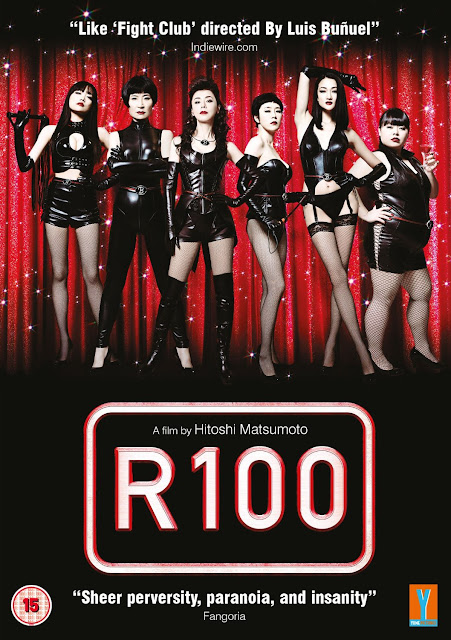I watch a lot of Asian cinema. I’m not entirely sure why,
and it’s reaching the level of a compulsion, but something fascinates me about
the cinematic output of Asia, from the Chinese chop-socky flicks of the
seventies, the ghost/curse-heavy Japanese horror scene of the early 00s, dark
and depressing South Korean thrillers, Thailand’s ridiculous and oft-silly action
flicks, Hong Kong’s kung-fu movies and Indonesia’s recent breakout of brutal
action films. I find it all very interesting, though there are some genres I just
never know what to expect from. While I’ve grown very familiar with Japanese
horror films, Yakuza flicks, Samurai dramas and live-action Manga adaptations,
there is one genre that continues to baffle me: Japanese comedy. I know the
comedy genre is a big one, and highly subjective, but I’ve never been able to
get a handle on any of the Japanese comedies I’ve seen. They’re all just so…strange?
Weird? Absurd? I don’t even know how I’d characterise them.
Thus we get to R100, an exceptionally weird Japanese comedy
that starts out as a risqué dramedy before becoming something vastly different.
R100 is sort of amazing, especially if you go in with no prior knowledge or
expectations (meaning reading the previous sentence effectively spoiled the
ufn). Actually, maybe having a pre-conceived notion of what the film will be
like might make its surprises even more impactful. It certainly tricks you into
thinking you’ve got it figured out before it suddenly switches gears on you. In
that way it’s similar to a vastly different Japanese film, Takashi Miike’s
psycho-thriller ‘Audition’. That movie lulls you into a false sense of security
in its first half, playing out like an ordinary drama before things get dark
and twisted. R100 is vaguely like that, in that the first half eases you into a
state of comfort where you think you’ve got the movie figured out, and then it
does everything possible to go against any logical expectations you might have.
Takafumi is an honest, hard-working furniture salesman who
lives an ordinary, drab life devoid of excitement. His wife has been in a coma
for several years and he raises his young son in the small apartment where they
live. Takafumi decides to try and spice up his life by joining the mysterious
and secretive Club Bondage, an eccentric and exclusive S+M club with a peculiar
contract: no ‘play’ happens at the club itself, and instead he will have a
series of ‘dates’ with a variety of dominatrix at public places where he’ll be
humiliated and beaten in various ways. The contract lasts for one year and
cannot be cancelled. At first Takafumi enjoys it – the excitement brings some
much-needed joy and unpredictability into his life, and helps him get through
his otherwise depressing and monotonous day-to-day routine. But soon the S+M
play starts to intrude into the rest of his life as the dominatrix begin to
target his professional life and his family too. And then things get weird.
R100 is a movie that wilfully defies your expectations by
first playing exactly to them. The early dramedy is played as earnestly as
possible (with some exceptions). Initially, you really feel bad for Takafumi in
his ordinary day-to-day life. Perpetually wearing the same drab suit every
time, powerless to save his wife and doing his best to raise his son, you feel
sorry for him. And then, when things start to get more dangerous and dark (and
silly), you feel for him even more. By the end though, things have moved beyond
such matters. R100’s turns are baffling and bizarre, but never boring. Part of
the film’s success is that it can change gears so quickly and drastically while
remaining very funny and extremely watchable.
The film generally has a dreary, almost colourless filter on
almost everything. Rooms rarely vary in colour from any variation of grey,
light brown or off-white. This starts to fade a little in the latter part of
the movie, but for the most part the film matches the drab, joyless, ordinary
life Takafumi lives. There are some visual quirks though, particularly when the
dominatrix get involved. Whenever Takafumi is reaching some sort of ecstasy,
his face is distorted as his eyes turn black, his cheeks puff up and ephemeral
ripples emanate from his head. It’s a peculiar visual image, one that gets
repeated throughout and is often used as a comedic punchline. Another great
source of humour is the fun poked at the normally uptight, overly polite and
professional Japanese people themselves:
whenever he’s being beaten or humiliated in public, everybody around
awkwardly averts their eyes and tries to go about their business as though it’s
not happening at all.
Initially the film manages the thin line between drama and
comedy quite well, especially when letting the comedy gently segue into
borderline horror. A sombre walk home down the street after Takafumi visits his
comatose wife is sad, until it’s punctuated by a leather-clad woman appearing
from out of nowhere to kick the shit out of him. Horror movie sting sounds
begin to herald the appearance of dominatrix. It manages to remain funny even
when it seems to go unexpectedly dark, before it takes a sharp, off-road turn
into weirdness. By the final third the film has evolved (or maybe devolved)
into something completely different. It’s impossible to go into without
spoiling it, but things get ridiculous. Whether this is good or bad will depend
on your own tastes, but I enjoyed it.
More than anything else, R100 caught me by surprise. I was
so sure early on that I knew exactly what it was and where it was going, but it
purposefully swerved away from all of that. I still have absolutely no handle
on Japanese comedy (I might understand even less now) but I had a lot of fun
watching R100.



No comments:
Post a Comment